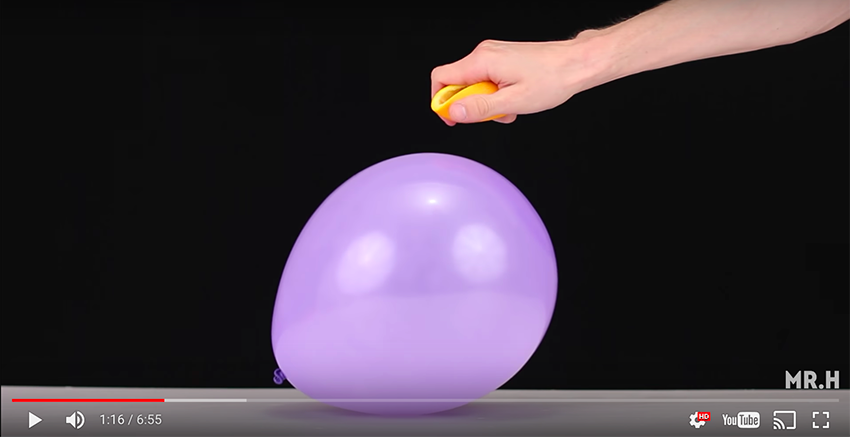Next time you’re bored at a party and want to take some kid’s money (kidding), bet said kid (still kidding) that you can pop a latex balloon using nothing but an orange peel and magic. Seal the deal by promising that you’ll never touch the balloon!
That’s right— latex balloons have a major citrus allergy.
There is a chemical in citrus fruits called limonene, which is a hydrocarbon that is actually used in many cosmetic, scented, and cleanser products as well as things like glues and paints. It’s what makes citrus smell like citrus.
But besides adding a tasty scent to products, limonene also happens to be a strong solvent, used in things like paint stripping products and oil removers.
As you might imagine and maybe have even experienced, limonene in citrus oils can cause skin and respiratory irritations in a small percentage of people, although the reactions are often minor and temporary.
For most latex balloons however, exposure to limonene is always fatal.
Try this at home:
1. Blow up a latex balloon.
2. Take a peel from a citrus fruit (an orange in this case) and squeeze it hard enough to spray the oil from the peel at the balloon.
3. Have someone cover your ears.
You’ll see that exposure to the citrus oil immediately pops your latex balloon. Why does that happen you ask? Well, we asked a science friend to explain it to us in laymen’s terms:
Limonene is a hydrocarbon. Latex rubber is also a hydrocarbon. Hydrocarbons will dissolve together if in contact with each other. So when the citrus oil touches the surface of the balloon, some of the latex from the balloon immediately begins to dissolve in the limonene. Result: Pop!
If you don’t want to do this at home, this video from Mr. Hacker, which offers 10 balloon “magic” tricks, includes the orange peel and the balloon experiment. Skip to the 1:08 mark if you want to get right to it:
Now, we should add that this will not always work with all latex balloons. Vulcanized rubber, which is rubber that has been treated with sulfur to be stronger than natural latex rubber, may not actually succumb to the citrus oil simply because the molecular bond in the rubber is not as likely to break apart as easily.
We tried to find a video for you that displays this and sure enough we came across this video from Tom Kuntzleman, comparing the effects of orange oil on a regular latex balloon versus a balloon made of vulcanized rubber:
So there you have it! If you want to make a few bucks off of someone with this trick, now you know how to do it! Just be sure the balloon you’re squirting isn’t made of vulcanized rubber.
Source: YouTube


